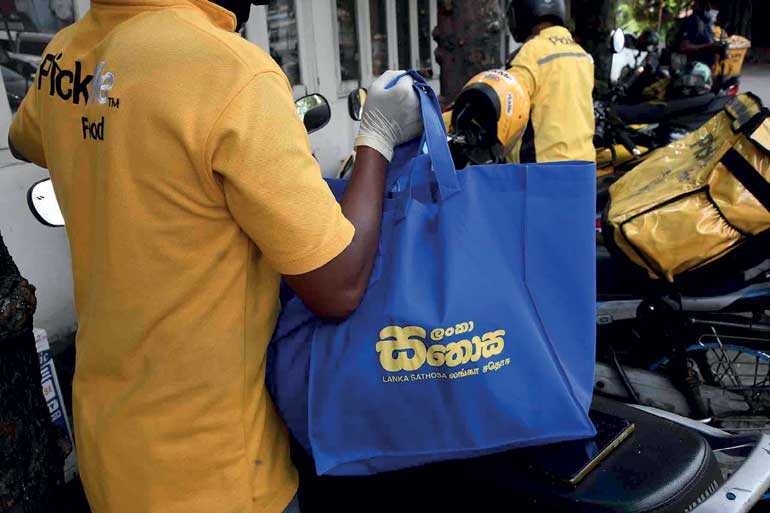Friday Feb 20, 2026
Friday Feb 20, 2026
Tuesday, 7 April 2020 00:00 - - {{hitsCtrl.values.hits}}

These are unprecedented times. Following health and safety guidelines with 100% compliance is non-negotiable. Having said that, while you look after your personal safety and that of your family, it is important that you rise up to the occasion. If more of you do that, it is only then that your enterprise can survive and come out a winner in the face of adversity – Pic by Shehan Gunasekara.
With over 40 years of work experience, and having started at the bottom of the career ladder, and having lived through a number of adversities I thought of sharing these few thoughts with you.
I was reflecting on the meaning of our traditional greeting ‘Ayubowan’. We wish the other person long life. Life is the most precious and most important thing to every living being, not only to humans. All love their lives and fear being hurt and are afraid to lose loved ones and belongings; death. So wishing long life is very meaningful.
But as a civilisation why did we choose something like this as our day-to-day greeting? That is perhaps because we have been constantly challenged and had to face adversities as a civilisation. We had invasion after invasion from overseas. We had various natural calamities.
You might have heard of the Baminitiya Saya – a famine (103-89 BC) during the reign of King Valagambahu – and of the red eye disease during the reign of King Siri Sangabodhi. So we must have seen a lot of deaths and difficulties, our lives would have been shattered, hence the greeting ‘Ayubowan’.
To face such difficulties our kings focused on building large reservoirs known as “wewa” so the people would not starve. Today because of the nature of the COVID-19 virus we are seeing the relevance of ‘Ayubowan’ once again for real. (Though still the number of deaths are far less than the number of fatalities by road accidents on usual times!)
Living through challenges
The curfew and the physical distancing requirement has placed a new challenge to most part of the economy. We faced similar challenges though in a different way, but not that long ago. In 1971 the youth uprising was the first time most of the current working population first experienced what curfew was. Then during the 30-year bloody war we lived through, uncertainty was a constant.
In ’89 there was Government curfew and the JVP or DJV imposed curfew by a chit. Suddenly the towns were deserted. Those who did not obey their curfew were killed in their homes, offices, shops and temples. Public transport was disrupted and buses which ran during JVP curfew were burnt down. On the way to work you would see dead bodies being burnt with a few tyres around them. It was the fear of unidentified gunman the people were scared of. People went through unimaginable hardships to come to work. No mobile phones hence there was only hope until the loved ones returned home.
I used to work in an advertising company called De Alwis at that time. As you know when the economy slows down, one of the first things get cut is the advertising budget. But we never wanted to give up. Our GM at that time was Renton De Alwis, who later became the Chairman of Tourist Board, etc. The entire team rallied round him.
Every day we looked for new ways to earn money. We constantly followed up with clients and collected our dues. The television advertising was not practical for most clients, so I remember how we negotiated with the Tennis Club, and some other organisations with parapet walls, sold them as advertising space.
We discussed with Taj and started a changeable banner at the Gall Face Hotel end of the property. This was called the ‘Talk of the Town’ and every two weeks a new banner went up with a new commercial message. The first message was ‘I pick we pick we all pick Harpic,’ that is thanks to Nimal Goonawardena, who was bold enough to do an experiment. But there was no digital printing. It was by old screen printing on a cloth.
We had to make a pitch for the United Motors Account and the Japanese principals were going to be at the Hilton. We did not want to take a chance. We bought mats from Arpico and slept in office so the next day we could go to the presentation on time. We won the account. We had only one van and a car for all our transport needs, and still we did everything we had to do.
Because we had less business, time was used to teach and train the team. We did not have any of the tech facilities we have today. We used flip charts and magi boards to do our training. And of course whenever we had an opportunity we sang together. Alwis always led the singing. Now as I reflect, the six years I worked at De Alwis were the best days.
Then during my days at Eagle Insurance we were constantly challenged by the external environment. We had bombs going just the next door, had overseas visitors when the airport was bombed, and finally a part of the LTTE aircraft brought down by the Air Force fell on our building.
Almost every year when we sit for planning we consider the various scenarios and our planning never could take into account the north and east for most of my working life. Then we were hit by the tsunami; that was the first month for me as the MD of the company. My first press conference was on tsunami claims. Yet we always found ways to overcome the challenges. This was possible because there were some who would think out of the box come up with new ways to do things, new opportunities, and who did that extra bit for the enterprise.
We are facing a challenge that has engulfed not only us but the entire world. For the first time world experience the full impact of globalisation. The message that comes out is very strong. We need to think as citizens of the Earth, not only as citizens of a country, let alone as a member of a community. We need to think ‘HUMANITY’ not just ‘ME’ from a small mind.
Think of the enterprise
When it comes to the enterprise, the business we work as employees, we need to think of the enterprise. Some of us will have to work remotely, while some have to get out of the house and work.
These are unprecedented times. Following health and safety guidelines with 100% compliance is non-negotiable. Having said that, while you look after your personal safety and that of your family, it is important that you rise up to the occasion. If more of you do that, it is only then that your enterprise can survive and come out a winner in the face of adversity.
Here are some ideas that you may want to reflect on.
1. Appreciate that the owners of almost all the companies, except in the case of very large corporates, have pledged their personal assets to finance the functioning of the business. None of the employees have taken such risks when they come to work.
2. Ask yourself whether there is anything you can do to help the company at this moment. Some companies will get opportunities to demonstrate their exceptional commitment to customers. Can you offer to call some customers, write emails to your customers, follow up any payments that are due, design new processes using the current opportunity as an example, come up with new business ideas, can you help another colleague who has to do more work, do some in depth analysis of the business for new insights, do research to improve your products? What can you do, or suggest to reduce costs of your organisation, how to do things simpler, faster, better, safer, etc. Basically start thinking as the person who owns the business. That is the difference of an ordinary employee and an exceptional employee.
3. Even when the curfew is completely lifted the things will not be the same again. The businesses will change, consumer behaviour will change, demand patterns will change, the supply chain will take a new form, distribution will take a new dimension, some businesses will be no more. Think how your business can face such a situation. You will probably have the best idea.
4. This is the best time to develop your skills. Learn something new, practice some skill to improve your efficiency. Even if you can improve your keyboard skills to be super-fast, that alone can be an advantage. Learn a new language, learn a new technology.
In every team there are Climbers, Campers and Quitters. In a moment of adversity the Climbers continue the journey facing obstacles. The Campers wait till others face challenges and come back to the party to celebrate. The Quitters give up. Not only that, they join Campers and discuss why things are so bad and how nothing can be done.
So be a climber, and create the future you want and make your organisation a winning one. As a civilisation we have faced many such adversities and this too will pass.
(Deepal is a Management Development Consultant, Accredited Master Coach, mentor and author and serves on a number of boards as a non-executive director. He can be reached via [email protected].)